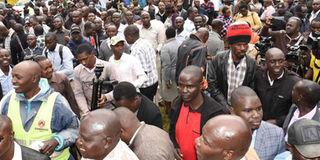Cartels delivered smuggled maize to NCPB to avoid suspicion

Uasin Gishu maize farmers meet with their leaders at the Teachers Advisory Centre in Eldoret town on May 28, 2018 concerning the maize scandal. PHOTO | JARED NYATAYA | NATION MEDIA GROUP
What you need to know:
- Most major suppliers brought the maize from neighbouring countries through porous border points like Suam in Trans Nzoia.
- The Kenya Seed Company said that about 400 metric tonnes of their seeds were sold in Uganda last year.
Smuggled maize from the neighbouring countries were mostly delivered to the National Cereals and Produce Board (NCPB) stores at night in a bid to ward off suspicion from hundreds of local farmers who had lined up for days waiting to deliver theirs.
Farmers who stayed for days outside the Eldoret depot said there had been two parallel queues for delivery, one for them and the other for individuals whom they did not know.
The unknown individuals were attended to urgently as the farmers waited for weeks.
Even after the local farmers were told the stores were full in March, they claimed the agency continued to receive maize from the unidentified people.
UGANDAN MAIZE
Although most did not want to go on record, they said lorries belonging to top government officials were given direct access to the stores and those who complained were warned.
Most major suppliers brought the maize from neighbouring countries through porous border points like Suam in Trans Nzoia and delivered it in large quantities to depots like Moi’s Bridge, Bungoma and Kisumu.
The farmers said the maize from Uganda was also hardly unrecognisable unlike in the past years when one could easily tell it apart from the Kenyan maize.
Initially, maize from Uganda was yellowish unlike the Kenyan variety that is largely cream.
However, since last year, the Kenya Seed Company has been selling Uganda farmers similar varieties as Kenyans making it difficult to differentiate the two.
The company told the Saturday Nation that about 400 metric tonnes of their seeds were sold in Uganda last year.
SURPLUS
The company’s Managing-Director Azariah Soi said most of the seeds were sold near the border.
“We sell to Uganda some of our varieties. In some areas in Uganda they also grow varieties like the ones we grow in Kenya,” he explained.
On whether this made it easier for unscrupulous traders to import the maize to Kenya, Mr Soi said it was possible, adding that if the Ugandan market is flooded then the “maize will spill over to the Kenyan market”.
“We have subsidiaries in Uganda, Tanzania and Rwanda and one of the crops we sell is maize. So if they cannot consume maize then a lot of maize will spill over and that has been the case for so many years,” he noted.
PAYMENT
An audit report by the Agriculture ministry reveals disparities in dates entered for the maize delivered to the NCPB depots by cartels who pocketed Sh2 billion as genuine farmers continued to grapple with lack of market.
Staff in some of the depots admitted having received instructions from “powerful” individuals to clear maize from large suppliers and facilitate prompt payment as farmers queued for weeks.
“Policy inspectors were deployed to our buying centres to ensure that the imported subsidised maize from neighbouring countries do not end up in our stores,” said Mr Titus Maiyo, the NCPB communication manager in an earlier interview.
'BROKERS'
But farmers said they was no such vetting.
“We know some suppliers who were never vetted but went ahead to deliver the crop and received payment,” Mr Jesse Mais, former Eldoret South MP and a maize farmer, said.
Some of the traders took advantage of the desperation of farmers who had waited for long on the queues.
They bought maize from the farmers at cheaper prices and used their influence to deliver the crop to NCPB and received prompt payment.





